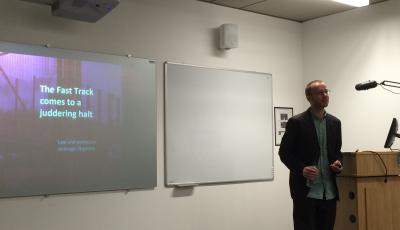Guest post by Jerome Phelps, Director of Detention Action, a national charity that supports people in immigration detention and campaigns for change to detention policy. This post was written as a follow up to a seminar by Jerome on 1 February 2016 hosted by Border Criminologies, the Refugee Studies Centre, and the Refugee & Migration Law Discussion Group. The podcast of the seminar will soon be available here.

For fifteen years, the Detained Fast Track had seemed an inevitable fact of the UK asylum system. Horribly unfair and unnecessary, yet politically untouchable, it was the price to be paid for any gradual improvements elsewhere in the asylum system. Ministers loved it and government officials wouldn’t hear a word against it. As for the asylum-seekers, who went straight to a high security detention centre, where they were rushed through a high speed asylum process, with little time to get evidence to support their case―their views hardly mattered, as they were so soon back in their countries of origin, their fates unknown.
Yet last July, it took only a matter of days for the Fast Track finally to come to a juddering halt. In litigation brought by my organisation Detention Action, the High Court found that the judicial rules governing the Fast Track appeals process were so unfair as to be unlawful. The Court of Appeal first suspended the Fast Track appeals process, then, as it turned out definitively, upheld the High Court judgement that the rules were unlawful. And the Home Office conceded a separate case, brought by four torture survivors, accepting that they should never have been detained on the Fast Track, and that the process was still operating unlawfully. With both the initial decision stage and the appeal stage having been found unlawful, Immigration Minister James Brokenshire had little option but to suspend the Fast Track.
Is this then a straightforward story of the courts striking down an unlawful government practice? Was it just a question of, somewhat belatedly, coming up with the right legal argument, and leaving the law to take its course? The reality is a little more complex.
For one thing, it’s hardly the case that the Fast Track lacked legal scrutiny during the years of its operation―its unlawful operation, we can now say. It was challenged, unsuccessfully, in the European Court of Human Rights and by strategic litigation in the UK courts. Individuals took their cases to the High Court in large numbers. Indeed, Detention Action’s litigation had been ongoing for two years, and had already yielded two previous findings of unlawfulness before the Fast Track was finally halted.
If the Fast Track was unlawful, why did it survive for so long?
There is a legal answer to this question, which involves highlighting the brilliance of our legal team at Migrants’ Law Project, and their innovative challenge to the legal machinery itself. But it’s not a complete answer.
The reality is that, in an area of government policy of such high political sensitivity, law and politics cannot be separated. The Fast Track Rules that were found to be unlawful had been drafted, with apparent reluctance, by a judicial body under considerable political pressure, following a direct intervention from the Home Secretary. Even after the High Court had found that those rules were unlawful, the judge initially allowed them to continue operating, after the government argued that it would be ‘inconvenient’ to suddenly suspend them while the Lord Chancellor appealed. Never mind the inconvenience to asylum-seekers going through an unlawful process in which their lives were at stake: the High Court ruling was initially stayed until we persuaded the Court of Appeal to lift the stay.

Watching from the gallery through our seven days in the High Court and four Court of Appeal hearings, it wasn’t hard to see the discomfort caused to judges by the idea of stopping the Fast Track. In the end, we obtained a series of courageous and well-argued judgements, which together amount to a picture of a fundamentally dysfunctional system. But it’s important to note the incremental nature of our progress through our litigation: each judgement took us a step closer to bringing down the Fast Track.
This caution, I would argue, was inherently political―not in the sense that judges were inappropriately deflected from their focus on the law by base political considerations, but rather that in an area such as asylum law, there’s no clear dividing line between law and politics.
It is, indisputably, for the government to design the asylum system. Inevitably, it will take into account the high political passions that the issue arouses. The phrase ‘bogus asylum-seeker’ abounded in tabloid discourse at the time of the creation of the Fast Track in the early 2000s. It has receded since, but the focus on Calais has reawakened anxieties about migrants taking advantage of our generosity.
It is for the courts to respect this political prerogative of the government whilst ensuring that any system is lawful. The problem is how. A single case cannot demonstrate systemic unlawfulness, as it might simply be an exception. On the other hand, theoretical discussion of how the system is meant to work risks missing the reality of actual unfairness in actual cases.
The test against which judges have to measure this complex mixture of the theoretical and empirical is one of unlawful unfairness. This is a legal test that has rarely been invoked and for which there is little case law. So the judge is left weighing up what level of unfairness is permissible, balanced against the operational needs of running an asylum system.
This is a matter of judgement and one that, naturally in our view, the High Court and Court of Appeal handled well. But it’s a judgement that is inseparable from politics.
If we acknowledge that the surrounding political discourse is not irrelevant to the outcomes of litigation, then the initial question of why the Fast Track was (only) unlawful in 2015 looks rather different.
In the month before the crucial judgement of the Court of Appeal, the cross-party Parliamentary Inquiry into the Use of Immigration Detention published its ground-breaking denunciation of the detention system. Describing the use of detention as ‘expensive, ineffective and unjust,’ the Inquiry concluded that ‘we cannot go on as we are.’
The government, however, refused to accept the Inquiry’s recommendations, but commissioned its own review of welfare in detention. The Shaw Review report, finally published in January 2016, amounts to a more restrained but equally fundamental assault on the basic premises of current detention practice. This time, the government has said that it ‘broadly accepts’ Shaw’s recommendations.
It would be wrong to argue a direct causative link between this shift in the political discourse and the court judgments, particularly as the Fast Track was not a focus of either report. However, each unexpected change makes more sense in this wider context.
Throughout the growth of immigration detention in the UK, from 2000 until 2014, the dominant political discourse was of an effective and necessary policy, with discreet and resolvable problems―under which could be filed deaths, disturbances, hunger strikes, and repeated rulings of unlawful detention. Since last year, the narrative has shifted towards a recognition that the problems of detention are fundamental and systemic. There is a startling congruence, in time and content, between the findings of the courts in our litigation, the reviews of detention, and now the Minister’s (albeit brief) statement setting out his plans for reform.
This may be how political change happens on difficult issues like immigration detention. For years, despite the weight of evidence, no progress. Then, suddenly, on multiple fronts, everything looks different. A policy which had enjoyed unfailing government support suddenly weakens.
The unpredictability of political change is a tough lesson for campaigners who must somehow make it happen. But this is perhaps what the vexed questions of campaign strategy and strategic litigation come down to. Success, never guaranteed, depends on the coming together of numerous factors in different fields of operation, until what had seemed inevitable suddenly becomes unacceptable.
Any comments about this post? Get in touch with us! Send us an email, or post a comment here or on Facebook. You can also tweet us.
__________
How to cite this blog post (Harvard style):
Phelps, J. (2016) Ending the Detained Fast Track? Available at: https://www.law.ox.ac.uk/research-subject-groups/centre-criminology/centreborder-criminologies/blog/2016/02/ending-detained (Accessed [date]).
Share:








